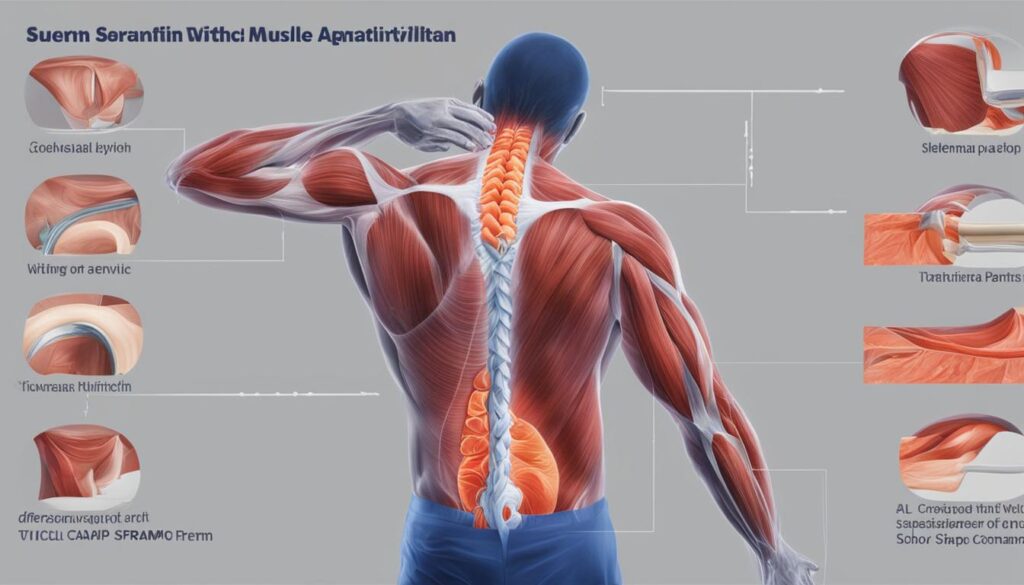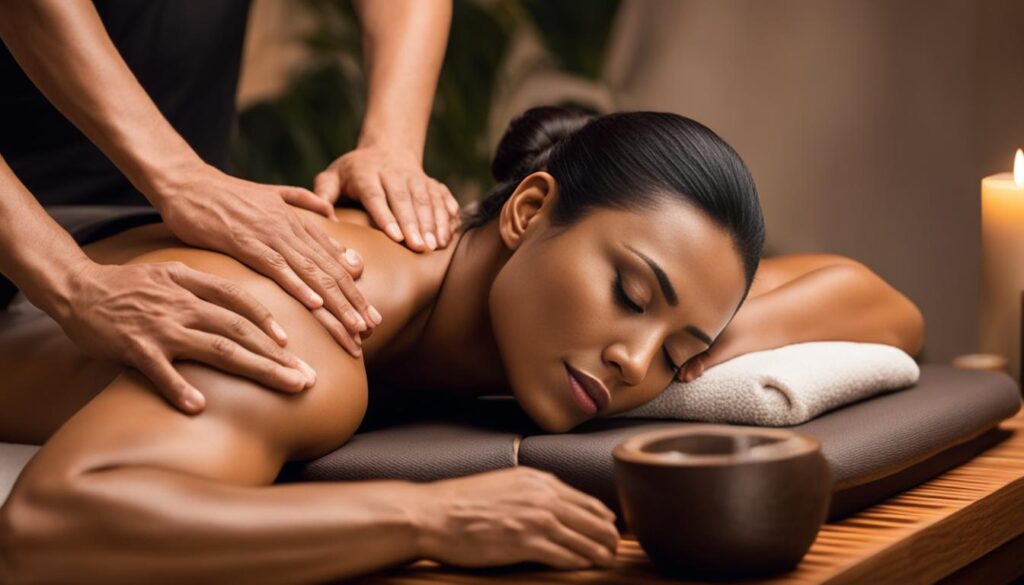Dealing with muscle spasms can be extremely uncomfortable and at times, even excruciating. These contractions or cramps, which can strike any muscle in the body, are generally unpredictable and abrupt. The duration of a muscle spasm can vary, lasting anywhere from a few seconds to approximately 15 minutes. They can range from feeling like a minor twitch to manifesting as a painful knot. Common causes could include muscle fatigue, dehydration, or even imbalances in your body’s electrolyte levels. Fortunately, techniques for relaxing muscle spasms and finding muscle spasm relief are within reach and can be achieved through natural muscle spasm remedies.
Home treatments such as stretching and massage, as well as the application of heat or cold, can often provide immediate relief. For more severe or recurring muscle spasms, medical professionals may recommend prescribed medications or physical therapy as part of a comprehensive treatment plan. This guide aims to provide useful tips and methods for muscle relaxation, helping you better manage and alleviate your muscle spasms.
Key Takeaways
- Muscle spasms can range in severity, from minor twitches to painful cramps, and can impact any muscle in the body.
- Common factors resulting in muscle spasms include muscle fatigue, dehydration, or an imbalance in electrolyte levels.
- Techniques for muscle relaxation and muscle spasm relief can be achieved through natural home treatments like stretching and massage, as well as the application of heat or cold.
- Healthcare professionals may recommend medications or therapeutic interventions for severe or continuous muscle spasms.
- A variety of natural remedies and muscle relaxation techniques can provide relief and help manage muscle spasms effectively.
Understanding Muscle Spasms and Their Impact on Your Body
Muscle spasms are involuntary contractions of a muscle group, occurring in a sudden and often painful manner. These spasms can range from quick twitches to severe cramps, leading to significant discomfort for the affected individual. The types, duration, causes, and treatment methods for muscle spasms can vary extensively, as we shall explore in this section.

Identifying Different Muscle Spasm Types
Muscle spasms can be classified into various types based on the muscles affected and the spasm characteristics. These diverge widely, from spasms in the legs, back, hands, feet, and toes to the less common fasciculations or involuntary twitches of small skeletal muscle fibers.
Duration and Intensity of Muscle Spasms
The duration of muscle spasms can range from fleeting seconds to painstaking minutes. While some spasms might surface as hard, knotted regions within the muscle, others transform into agonizing cramps disrupting normal muscle function.
Common Causes of Muscle Spasms
Several realities can trigger muscle spasms. These include imbalances in calcium, magnesium, potassium, or sodium levels, side effects of certain medications like statins, and medical conditions such as diabetes or Parkinson’s disease. Moreover, factors like dehydration, muscle overload, and reduced blood supply to the muscles can also precipitate spasms.
| Cause | Type of Spasm |
|---|---|
| Electrolyte imbalance | Leg cramps |
| Statins | General muscle pain and spasms |
| Parkinson’s disease | Dystonia (continuous spasms and muscle contractions) |
| Dehydration | Heat cramps and twitching |
When encountering frequent muscle spasms, it’s important to consult a medical professional. A healthcare provider can diagnose any possible underlying conditions, offer appropriate muscle spasm treatment, and provide tailored advice to prevent future spasms.
Relaxing Muscle Spasms: Natural Remedies and Techniques
Muscle spasms can cause discomfort and hinder everyday functioning, but a variety of natural remedies and techniques can provide relief. Instead of relying solely on over-the-counter relaxants for muscle spasms, making certain lifestyle changes and adding natural products to your daily regime can be beneficial.
Begin by incorporating certain foods into your diet that have anti-inflammatory and antioxidant properties and may serve as effective home remedies for muscle spasms. For instance, cherries and blueberries are excellent choices. Protein-rich foods like cottage cheese, Greek yogurt, lentils, and black beans can also be beneficial thanks to their muscle relaxation properties.

Another approach involves herbal solutions. Turmeric, ginger and cinnamon, containing high amounts of the compound curcumin, can assist in the alleviation of muscle spasms due to their anti-inflammatory properties. Magnesium-rich foods, such as spinach, seeds and dark chocolate, can further prevent spasms by balancing out electrolyte levels and promoting muscle relaxation.
| Natural Remedy | Benefits |
|---|---|
| Cherries and Blueberries | Anti-inflammatory and antioxidant |
| Protein-Rich Foods | Assist in tissue repair and muscle growth |
| Turmeric, Cinnamon, Ginger | Anti-inflammatory |
| Magnesium-Rich Foods | Prevent muscle cramps, promotes muscle relaxation |
Topical solutions, such as capsaicin creams, CBD oil, and arnica gels, can directly target the problem area, providing immediate relief from muscle spasms. Their use stimulates blood flow, accelerates healing and contributes towards better muscle performance in the long run. Employing these alongside deep-tissue massage using essenitial oils like peppermint and lemongrass can further alleviate muscle tension and reduce inflammation.
Always bear in mind that while these therapies serve as beneficial muscle spasm remedies, it’s essential to seek professional help for recurring or severe muscle spasms.
“Regular stretching and exercises that strengthen the muscles can dramatically decrease the chance of muscle spasms.”
The Role of Stretching in Muscle Spasm Relief
In the quest for muscle spasm relief, few strategies are as effective or as expedient as stretching. As a non-invasive, self-administered method, it provides immediate relief by elongating the affected muscle. More than just a reactive approach, however, stretching is also a fundamental component of muscle spasm prevention.
Stretching Exercises for Various Muscle Groups
Given the variety of muscles in our bodies, generic stretching routines may not serve targeted muscle spasm relief. Thus, it becomes crucial to understand and practice stretches that align with specific muscle groups. For instance:
| Target Muscle Group | Recommended Stretch |
|---|---|
| Calves | Stand with one leg forward. Keep the back knee straight and lean into the wall until you feel a stretch in the back leg. |
| Thighs | Stand on one leg. Grab the foot of your raised leg and pull it towards the buttocks, keeping your knees together and pushing your hips forwards. |
| Back and Neck | Lay flat on your back, gently pull your knees to your chest while keeping your head on the floor. |
How Regular Stretching Prevents Spasms
Aside from immediate muscle spasm relief, regular stretching has a critical role in preventing future spasms. The consistent practice of stretching maintains an optimal length in the muscles, improves flexibility, and increases blood flow, all of which contribute to preventing spasms. As a tip, consider incorporating mild exercise, such as walking or cycling, before bed, to ward off nocturnal leg cramps. Remember, consistency is key in effective muscle spasm prevention.
Understanding and practicing adequate muscle spasm relief exercises could mean the difference between quick recovery and enduring unwanted pain. Therefore, make stretching an indispensable part of your routine for a healthier, spasm-free life.
Massage Therapy: A Soothing Solution for Muscle Spasms
When it comes to easing muscle tension and providing relief from muscle spasms, few methods can match the soothing effectiveness of massage therapy. Not just a blissful experience, massage therapy carries significant benefits for those suffering from muscle spasms. This practice goes beyond merely alleviating pain – it delves into the root cause of the issue, seeking to relax overworked or strained muscles. The potent combination of physical pain relief and muscular relaxation that it delivers makes massage therapy a preferred solution for many.
Specific techniques are employed during massage therapy for muscle spasms. Gently rubbing the affected muscle and applying slight pressure, akin to pinching, around the spasm site can bring about immediate comfort. These maneuvers work by stimulating blood flow within the muscle, promoting healing, and easing built-up tension. For persistent, stubborn spasms, particularly those in the back, a simple tennis ball can serve as an effective tool to pinpoint pressure and release tension.
Professional massage therapists, armed with specialized skillsets and comprehensive anatomical knowledge, can offer targeted strategies to counter muscle spasms and their root causes. Elements of physiotherapy are often incorporated within these strategies in severe or chronic cases. By marrying these therapies, individuals plagued by frequent or intense muscle spasms may find a more comprehensive, enduring solution – a path towards a pain-free life, powered by massage therapy benefits.





